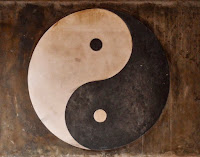 |
| heritage in chinese civilisation |
3.5 I Ching and TCM
i. I Ching explains health preservation through 12 hexagrams
ii. Fu (24), Lin (19), Tai (11) hexagrams show Yang Qi just generated, i.e. 'xiao nian', and so forth;
e.g. Fu hexagram indicates the stage of a baby just born, i.e. “one Yang returning” – a baby clenches fist with thumb pressed inside, pressing on Shaofu accupoint on the heart meridian. Even the baby needs to protect Yang Qi, i.e. Shenque acupoint on abdomen.
iii. Dazhuang hexagram (34) indicates teenager stage (suggesting like a sheep loose on the field), therefore, Dazhuang advises to learn how to let go like letting go sheep on the field. The person must learn to prevent aggressiveness and excessiveness, seek balance.
iv. Gou hexagram (44) indicates middle age, that Yin Qi comes, therefore, should pay attention to our choice, i.e. should choose something related to Yang, i.e. avoid behaviours, habits etc, that harm Yang Qi; protect Yang Qi through:
a. diet, avoid cooling food
b. adjust mentality and emotion; balance mental state and emotion
v. Dun hexagram (33) indicates we have two tails, positive and negative, i.e. it is difficult to escape when one has too big a tail
Positive: when young accumulates wealth but do not be showy; Negative: when accumulates bad habits, should learn to abandon them.
Idiom – too difficult to hide tail; also, tail too big to wag – i.e. difficult to change bad habits.
vi. Bo hexagram (23) is also about old people needing to preserve health. With reference to the 5th line, it suggests that tolerance is most important like the Empress leading the concubines to receive the Emperor’s favour.
vii. Guan hexagram (20) is also for the old on preserving health. It says “know the seasonal change by observing the natural law and spread humanisation all over the country by observing human affairs and ethics”, i.e. the old must observe changes in heaven, earth and man, observe them with their hearts. The old must be contented with their lot and do things accordingly.
viii. The old should pay attention to giving up something, as suggested by the last three hexagrams.
ix. The 12 divinatory hexagrams show how to obtain something; the first six indicates how to obtain, i.e. Yang Qi has to rise, therefore, has to follow it and not affect it. Then, Yang Qi comes down, and one has to protect it via:
a. protect and tonify kidneys, according to I Ching based on Yin-Yang equilibrium, five elements which relate to the five organs, five cereals, five vegetables and five fruits, e.g. black food like black soya beans, black sesame tonify kidneys; also care for the brain because brain is connected to kidney, eat walnuts to nourish brain.
x. In conclusion, the I Ching which lays the foundation for the concept of Yin-Yang, relates to health preservation by the “harmony between Yin and Yang”, i.e. 'Yin Yang zhong he'
xi. Man is of Yin and Yang nature, so are all things in the universe and in nature, therefore, all cannot go against this law, e.g. when reaches Kun hexagram (2), of only Yin lines, one must think of moving on to the next thing to do, i.e. the next hexagram, which is back to Fu hexagram (24), i.e. when it is only Yin lines, one must think of Yang, when it is only Yang lines, Qian hexagram (1), one must think of Yin, then the heart will be strong.
xii. The four stages in life should follow the law of changes in Yin and Yang; change accordingly, when there is need to acquire, do it; when there is need to give up, do it. TCM is all about the balance of Yin and Yang.
Laozi said, “People should increase their knowledge when doing research, but decrease their subjective consciousness when seeking truths”.
* Heritage in brief, for contemplation






